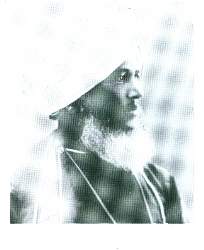 Lala
Deen Dayal was born in 1844 at Sardana near Meerut. He joined Thomson Civil Engineering
College in Roorkee to learn photography. In 1866 he joined the Government service
at Indore but left the service after a short period to take photography as a serious
hobby. He was encouraged to do so by $ir Henry Daly, the Agent to the Governor General
for Central India. In 1865 Deen Dayal started his firm in Bombay under the name
Deen Dayal and Sons. Deen Dayal was officially engaged by the British to compile
an album of the monuments of Central India. The album was presented to Queen Victoria.
Lala
Deen Dayal was born in 1844 at Sardana near Meerut. He joined Thomson Civil Engineering
College in Roorkee to learn photography. In 1866 he joined the Government service
at Indore but left the service after a short period to take photography as a serious
hobby. He was encouraged to do so by $ir Henry Daly, the Agent to the Governor General
for Central India. In 1865 Deen Dayal started his firm in Bombay under the name
Deen Dayal and Sons. Deen Dayal was officially engaged by the British to compile
an album of the monuments of Central India. The album was presented to Queen Victoria.
In 1884 he visited Hyderabad to complete another album with a letter from Lord Dufferin
to Mir Mahboob Ali Khan, Nizam VI. By that time Deen Dayal’s reputation as an outstanding
photographer was confirmed. Nizam VI was very impressed with Deen Dayal’s work and
he was persuaded by the Nizam to accept an appointment as his Court Photographer
and also to settle down in Hyderabad. Thus his firm “Raja Deen Dayal and Sons” came
into existence in Secunderabad around 1.885.
Deen Dayal photographed the Nizam at
ceremonial parades, receptions and on hunting trips. At that time Secunderabad was
one of the largest cantonments in India and a potential source of endless business.
In 1887, Queen Victoria granted a royal warrant of appointment, and this is the
first royal appointment in India awarded to an Indian firm. In 1892 Deen Dayal opened
a Zenana (Ladies) Studio in Hyderabad for the Purdah Ladies. At the peak of this
firm’s prosperity Deen Dayal engaged more than fifty people. He accompanied Lord
Curzon during his visit to Hyderabad in 1903 and the Prince of Wales during 1905-06.
He took 5000 photographs and they were greatly admired. Deen [)ayal and Sons had
a branch of their firm at Hornby Road, Bombay, which was closed in 1910. Deen I)ayal
was awarded the title of Raja Musavar Jung Bahadur by Nizam VI in recognition of
his meritorious photographic services. On the demise of Raja Deen Dayal in 1906,
his son Raja Gyan Chand maintained the establishment at Secunderabad. After the
death of Mir Mahboob Ali Khan Nizam VI the firm continued to get the patronage of
Mir Osman Ali Khan Nizam VII.
Raja Gyan Chand died in 1916 leaving behind him three
sons, Trilokchand, Hukumchand and Amichand. Amichand continued to maintain the family
business in Hyderabad till his death. However, even today the family business continues.
Recently the family sold the photographic collection to the National Museum, Delhi.
Raja Deen Dayal and his photographs have left us a pictorial archives of priceless
value and his photographs are displayed in many old houses in Hyderabad. |